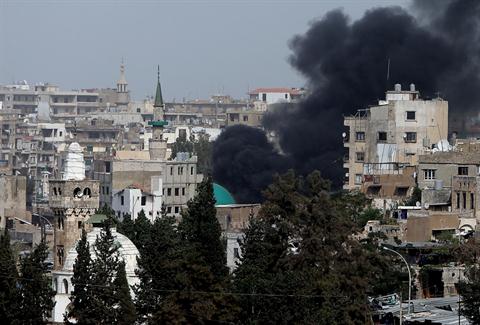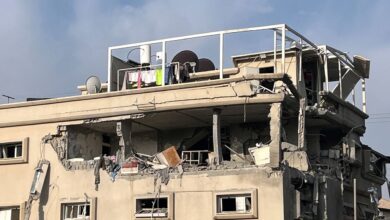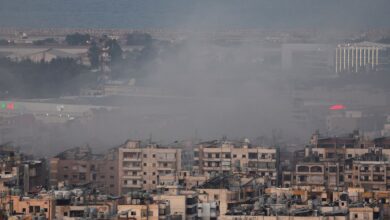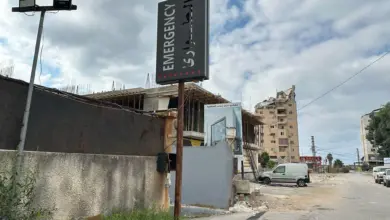
At least seven people were killed and dozens wounded in gunbattles in the Lebanese capital Beirut and coastal Tripoli on Monday in further unrest linked to the conflict in neighboring Syria, security and hospital sources said.
The clashes have heightened fears that Syria's civil war with its sectarian dimensions is now spreading into Lebanon, pitting local allies and opponents of Syrian President Bashar al-Assad against each other.
The Lebanese army promised decisive action to quell the violence, which was touched off by the assassination of a senior intelligence officer last week.
That killing has plunged Lebanon into a political crisis and the army command urged party leaders to be cautious in their public statements so as not to inflame passions further.
It issued the warning after troops and gunmen exchanged fire in Beirut's southern suburbs overnight and on Monday morning while protesters blocked roads with burning tires.
Many politicians have accused Syria of being behind the killing of Brigadier General Wissam al-Hassan, an intelligence chief opposed to the Syrian leadership, who was blown up by a car bomb in central Beirut on Friday.
Opposition leaders want Prime Minister Najib Mikati to resign, saying he is too close to Assad and his Lebanese militant allyHezbollah, which is part of Mikati's government.
Young victim of sniper
The worst of the clashes since late Sunday took place in the northern city of Tripoli, the scene of previous fighting between Sunni Muslims backing the Syrian insurgents and Alawites sympathetic to Assad.
Six people were killed and about 50 wounded in fighting between the Sunni neighborhood of Tabbaneh and the Alawite Jebel Mohsen, security and hospital sources said. The two sides exchanged rocket and gunfire, residents said.
Among the victims were a 9-year-old girl shot by a sniper.
Fighting in Beirut occurred on the edge of Tariq al-Jadida, a Sunni Muslim district that abuts Shia Muslim suburbs in the south of the capital.
Residents had earlier reported heavy overnight gunfire around Tariq al-Jadida between gunmen armed with rifles and rocket-propelled grenades.
Soldiers killed one gunman in Tariq al-Jadida, the army said, a Palestinian from a refugee camp who had shot at them.
The violence escalated on Sunday after thousands of people turned out in Beirut's Martyrs' Square for the funeral of Hassan, who was buried with full state honors in an emotionally charged ceremony.
As the funeral ended, hundreds of opposition supporters broke away and tried to storm the nearby government offices, prompting security forces to fire tear gas and shots in the air to repulse them.
The army command said in its statement that Lebanon was going through a critical time.
"We will take decisive measures, especially in areas with rising religious and sectarian tensions, to prevent Lebanon being transformed again into a place for regional settling of scores, and to prevent the assassination of the martyr Wissam al-Hassan being used to assassinate a whole country," it said.
Troops in full combat gear and armored personnel carriers stood guard at traffic intersections and government offices, with barbed wire and concrete blocks protecting buildings.
Beirut was noticeably quiet as people stayed at home because they feared being caught in more violence. In the downtown, many shops, offices, restaurants were shut or empty and the area was free of its normal traffic chaos.
Lebanon is still haunted by its 1975-1990 civil war, which made Beirut a byword for carnage and wrecked large parts of the city.
Since then it has undergone an ambitious reconstruction program and enjoyed periods of economic prosperity due to its role as a trading, financial and tourist centre. All that is now threatened.
Power vacuum
The crisis underscores local and international concern that the 19-month-old, Sunni-led uprising against Assad, an Alawite, is dragging in Syria's neighbors, which include Turkey and Jordan as well as Lebanon.
The slain Hassan was a senior intelligence official who had helped uncover a bomb plot that led to the arrest and indictment in August of a pro-Assad former Lebanese minister.
A Sunni Muslim, he also led an investigation that implicated Syria and the Shia Hezbollah in the 2005 assassination of Rafiq al-Hariri, a former prime minister of Lebanon.
Mikati offered to resign at the weekend to make way for a government of national unity, but President Michel Suleiman persuaded him to stay in office to allow time for talks on a way out of the political crisis.
Mikati, a Sunni Moslem, had personal ties to the Assad family before he became prime minister in January last year, two months before the anti-Assad uprising erupted. His cabinet includes Assad's Shia ally Hezbollah as well as Christian and other Shia politicians close to Damascus.
If he was to stand down before an alternative was worked out, it would mean the collapse of the political compromise that has kept the peace in Lebanon and leave a perilous power vacuum.
Ambassadors from the United States, China, Russia, Britain and France met Suleiman on Monday and appealed to Lebanese leaders to resolve the situation peacefully.
One Western diplomat, asked if he thought the Mikati government would survive, told Reuters: "I think it looks more likely today than yesterday that he will come through in the short term. It will take time to form a consensus on an alternative and in the meantime the security situation needs time to recover."




